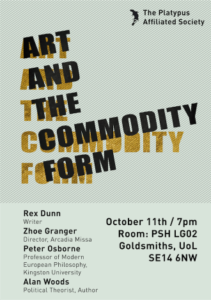Art and the Commodity Form
Goldsmiths University of London,
SE14 6NW
Zhoe Granger (Director, Arcadia Missa)
Peter Osborne (Professor Of Modern European Philosophy, Kingston University)
Panel description: If it is true that the 'commodity-structure' (Lukács) is the defining feature of modern capitalism down through the present, then it stands to reason that it has no less impacted the way art is produced, consumed, circulated, and exchanged. This shift in art's character happened both objectively (e.g., as in an article produced for exchange on the market), and subjectively (i.e., as a kind of experience and form of expression for the social and individual body). However, art's relationship to its status as a commodity is an ambivalent one: Art has become at once more free from past forms of domination, but its freedom is constrained when subject to the dynamics of capital.Art as a commodity is both its cure and poison, and has evolved into a social problem for its practice. Since becoming aware of this problem, artists, philosophers, curators, and critics have taken various approaches in seeking to overcome it.
How has art under a capitalist society changed from its pre-capitalist practices? What is the commodity form, and what is art's relationship to its logic? Must art seek emancipation from the commodity form, or is it at home in it? In what sense does art take part in the Left and emancipatory politics, if at all? By asking these questions, this panel seeks to reinvestigate art's relationship to the commodity form, and make intelligible how this problematic relationship still sticks with us today.


